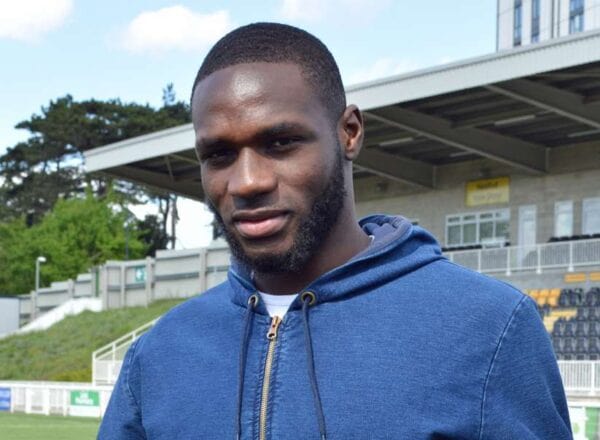Introduction
Football scouting is an essential yet often overlooked aspect of the game. Behind every rising star, there is a keen-eyed scout working tirelessly to identify, assess, and recommend talent.
In this exclusive interview, we sit down with Immanuel Parry, a seasoned football scout, to gain insight into the world of talent identification.
With experience spanning top clubs and extensive knowledge of the scouting landscape, Immanuel shares his journey from playing football to becoming a scout, the challenges he faces, and what it takes to spot the next big talent.
Whether you’re an aspiring scout or just curious about the behind-the-scenes of football recruitment, this conversation offers a fascinating look into the dedication and skill required in the profession.

Interview:
1. What inspired you to pursue a career in football scouting?
- I was in football my whole life and playing matches. However, it’s not until I went to Man City and seeing how scout actually work that when I realised that was my next path after playing football.
2. Can you describe your journey into scouting and any relevant education or experience?
- My transition was smooth. The person who first introduced me to football also introduced me to scouting. There I learned about creating presentations, writing and report. I had to learn on the job, picking up kills since I didn’t have the academic background prior.
3. What are your primary responsibilities as a worker in football scouting?
- I’m mainly based in the south of England, scouting the best talent from the age of 13-18. I mainly work in Portsmouth Brighton, Southampton and all across the midlands.
4. How do you identify talent, and what specific attributes do you look for in players?
- Every club is different. Football is a game of opinion in terms of physicals attributes. Thus we look for the elite in speed and strength as well as technically gifted players. So we aim for a full packed to the best of the best players.
5. What types of players or positions do you typically scout for?
- Every position and the best of the best.
6. What does a typical day look like for you as a scout?
- A typical day would be a lot of phone calls, speaking to agents, clubs, networking and research on what’s going on in the weekend. Additionally, looking at video work and going out live to watch games.
7. How do you prepare for scouting assignments or matches?
- I prefer to go to matches, because I feel as though there is more rewards in spending time out in the field. As head of the market, I enjoy finding players who haven’t yet made it out onto the scene.
8. What are some of the biggest challenges you face in your role?
- It’s very time consuming. The social balance and work life is difficult to balance at time too. Additionally, there is a lot of travel as you covering a whole country
9. Can you share a particularly rewarding experience related to a player you scouted?
- One of the most rewarding parts of scouting is tracking a player for 12-18 months. Then seeing them settle and perform exceptionally well at a club. Additionally, watching a player breakthrough, and make their first professional debut. Actually making their mark as a footballer.
10. How do you handle disagreements or differing opinions with coaches or management regarding player evaluations?
- Personally football is always going to be a game of opinion. But you just have to remain firm and strong in your opinion. Listen and learn, but be strong and bold and not following everyone. Take certain things with a pinch of salt, it makes take a bit of time for them to see what you can see.
11. How do you stay organized and track your findings on multiple players?
- Organisation is a massive part. Creating your own database, staying on track, being on top of your work, and stay super organised is crucial. There are 1000 of players I work with. So staying organised and create a list of urgency of players you should work with at what urgency and time.
12. How do you build relationships with coaches and other scouts in the industry?
- As time goes, you get more comfortable with getting out there more and speaking to people. Place yourself in positions and environments where you can connect with people and networking with different people.

13. What role does communication play in your job, both with players and within your team?
- Communication is massive. In order to be allied as a company and team to strategies, the communication has to be very clear with what when and how things are going to be done.
14. What trends do you see emerging in player football scouting and evaluation?
- The trend happening now is that football is become a lot younger. Most top players are way younger than what ITV was 10 years ago and how close football and the culture like football and musicians are become the same with now bot young and influential so
15. How do you maintain a work-life balance, especially considering the travel and time commitments of football scouting?
- Football is always happening around social hours, when everyone’s done working after work or weekends when everyone’s free but you’re not.
16. What do you do in your free time to unwind from the demands of the job?
- Finding new interests, spending time with family maybe watching other sports to not be so consumed by football. Get out your comfort zone to stimulate your mind
17. How do you envision the future of football scouting, particularly with the rise of data analytics?
- In different markets its different data and analytics is going to be massive. It’s going narrow down top players and players with real potential.
18. What advice would you give to someone aspiring to get into football scouting?
- Get out there watch as much games and create your own player you think are good. Your own little dossier of players and where you think they can go.
19. What is one misconception about scouting that you would like to clarify?
- The Detail that goes behind signing and identifying top players is something that goes over heads. It can take 18 months. Furthermore, scouting takes a lot longer and difficult most players are watched under a microscope
- As a scout you watch more bad games than good games
20. What qualities do you believe are essential for a successful scout?
- Self motivation, organisation, you have to be hard working and having a strong opinion
To conclude Immanuel Parry’s talk on football scouting
Immanuel Parry’s insights offer a fascinating glimpse into the world of football scouting. His journey from player to scout highlights the importance of experience, adaptability, and perseverance in identifying top talent. From evaluating young prospects to navigating the demands of travel and networking, Parry emphasizes that scouting is both an art and a science—requiring keen observation, patience, and a strong personal vision. As football continues to evolve with the rise of data analytics and younger emerging stars, scouts like Parry play a crucial role in shaping the future of the game. His advice to aspiring scouts is simple yet powerful: watch as many games as possible, stay organised, and trust your instincts.
Thank you for reading, click the link to read more of our Interview Articles
Zita Salum, a British, Tanzanian journalist with a London heart, is making waves in the world of media. Born and Raised in Hackney London, she discovered her passion for storytelling at a young age. Her journey began as an admin for the Inside Success magazine, but her talent quickly shone through. Zita's ability to craft compelling narratives and her knack for capturing the essence of a story led her to become an editor for the magazine.
From there, her career soared. Zita has contributed to a diverse range of publications, including the prestigious W magazine, showcasing her versatility as a writer. Her expertise spans across industries such as music, corporate, political, sports, arts, and fashion. Beyond her written work, Zita has also excelled in broadcast journalism. Her natural ability to connect with interviewees and her engaging hosting style have made her a sought-after talent in the industry.
In her free time, Zita is a dedicated networker, attending industry events and immersing herself in the latest trends. She is also passionate about investigative journalism and has produced creative documentaries that shed light on important issues. With her talent, drive, and unwavering commitment to her craft, Zita Salum is undoubtedly a rising star in the world of journalism.



